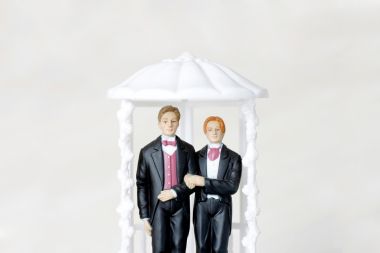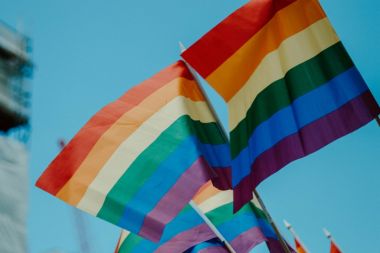
Leading US evangelical pastor, Alistair Begg, has spoken into the issue of trans wedding ceremonies (and I include gay weddings) and whether practising Christians can attend in good conscience. In short, he says yes with caveats, and has placed it in a wider relational and evangelistic context.
Various heavyweights have written in response, from the brilliant Rob Gagnon to academic Carl Trueman to Christian Concern’s Paul Huxley and US pastor Kelly Williams. They dissent and base their views on sound exegetical, theological, biblical and pastoral arguments and insights, such as how attendance tacitly or overtly endorses and celebrates a ritually transgressive sexual union and how, given the content of 1 Corinthians, St Paul would never – could never – have given such advice.
Mourning, not dancing
Here, I have a slightly different focus, and to clarify, I address those holding to an orthodox view of sexual morality.
I believe that such an event ought to elicit mourning, not celebration. If we are convinced that this sexual union is sinful, how can we do otherwise? And to be sure, there are many relational aspects we would commend, but it’s essential sexual nature challenges Jesus’ own authority.
The larger issue: Alfred Kinsey’s lethal legacy
In my view, the Church has never properly responded to the faux science/propaganda – ‘just little bits of naughty fun!’ – which forms the ideological basis of Kinsey’s pan sexual revolution. And to be sure, first heterosexuality was allegedly ‘liberated’. After that, we saw LG (lesbians and gays) then B (bisexuals), then T (transgenders) and now Q (queer/non binary), but other less socially acceptable sexual minorities are heading out of their closets now too.
This revolution has largely enveloped, certainly infiltrated, the institutions and culture of the West, including the Church. In the main, there has been little redress or pushback.
Haunting fear
What compounds this is an aspect which the 20th century American satirist, HL Mencken, noted about Puritanism and which is arguably part of this wider conversation. For Mencken, Puritanism was ‘the haunting fear that someone, somewhere, may be happy’.
Though a dreadful caricature – Jim Packer would be rightly horrified – I believe there is a semi-conscious fear lurking in wider evangelicalism that others will experience us as modern-day Mencken Puritans. And who wants that?
Even if it is completely false, how can one negotiate such minefields well? God hates sin but how do we do life well in a world filled with it?
I suggest four strategies here to answer this question.
One: do it with repentance and tears
What about us? Do we have ‘stuff’ which needs addressing? Has God been trying to get our attention here? What do we know we need to repent of i.e. think about and do differently, and how will we make it happen?
Jesus’ admonition in Matthew 7 about removing the log from our own eye before attending to the specks in the eyes of others comes to mind. Given the serious nature and large size of these ‘specks’, it is vital for us to see clearly!
Secondly, the great Francis Schaeffer offers a way forward here – and thanks to Bill Muehlenberg for this quote.
“With love we must face squarely the fact that our culture really is under the judgement of God … Through the work of the Holy Spirit there must be a simultaneous exhibition of God’s holiness and His love, as we speak … It will not do to say these things coldly. Jeremiah cried, and we must cry for the poor lost world, for we are all of one kind [emphasis mine].”
Two: do it with empathy and compassion
Many in the LGBTQ communities have been through the wars and carry the scars. I regularly note the vital role of ‘coming out’ as part of Kirk and Madsen’s wider strategy in After the Ball: How America Will Conquer Its Fear and Hatred of Gays in the ’90s. And though it took longer, it has worked to perfection. Their other brilliant strategy was to insist ‘orientation’ and race were equivalent: ‘anti-gay’ equals a homophobe, which in turn equals a racist (hiss boo).
Their allies – non-LGBTQ families, friends, colleagues – often know of and sympathize with their tragic pasts – and rightly so. Many never asked for these desires which often emerged with a vengeance around adolescence, unwanted and unasked for, feared and loathed. Many fought them valiantly but ultimately unsuccessfully. On the surface, wouldn’t it seem that the ‘wedding’ route was the kindest, most honourable, decent and practical way forward? We deceive ourselves – and others – if we believe this to be true.

Three: do it with reality
Sin hates us. Traditionally and historically, ‘the World, the Flesh and the Devil’ have been the noxious triumvirate besetting humanity, tempting, corrupting, damaging, destroying cultures, peoples, communities, us. Some evils are obvious, but others far less so.
In my view, we struggle to believe that sin is that bad, that damaging, that corrupting. We would have a far easier time engaging these minefields though if we were convinced of their harms.
My sin destroys me, even as your sin destroys you, if not sooner, then later. How is it kind or loving to pretend otherwise?
A Victorian saying comes to mind: ‘All sin is dogged; and though that which follows may lag, it never loses the track’ (Lucy Clifford, ‘The End of her Journey’, 1887).
‘We’ve only just begun’
On another front, the sad fact is that most of the evangelical world, including leading public figures and networks, appear blissfully ignorant of the emerging, alarming pan sexual revolution. If they do realize its full extent, they largely remain mute, certainly in public.
Indeed, saying ‘no’ to this particular counterfeit – same-sex marriage – is in fact far harder because most have little idea of what is involved nor how, bar a miracle, what is in the pipeline will become the ‘new normal’.
The tragic realities of same-sex marriage
An important caveat here. Some couples appear models of exclusivity, intimacy, care and human flourishing. I wish them well though I grieve their modelling of this template to the next generation. Also, I am appalled by the ferocity with which activists target dissenters, and the subsequent apathy and complacency of conservative leaders in the face of these public miscarriages of justice.
However, even if same-sex couples seem to be ‘perfect’, I cannot affirm their sexual relationship and will pray it ends. And here, Rosaria Butterfield’s Afterword in her new book Five Lies of Our Anti-Christian Age, in which she writes about the difference between acceptance and approval is helpful.
Downsides of same-sex marriage
Few seem aware that same-sex marriage does not automatically operate along heteronormatively monogamous lines. Each couple decides how they will be ‘faithful’ and in particular, whether they will be sexually open (to others) or closed, exclusive, monogamous.
Many male couples, especially younger ones, start ‘closed’ and then ‘open’ to survive. See the recent ‘The Couples Study’ and compare it with the older study, ‘Beyond Non Monogamy’. See also this insightful analysis of why so many gay couples open up their relationship.
Lee Badgett, in his 2010 book When Gay People Get Married, quoted the words of one man in a same-sex marriage who had quipped that “Fidelity is not between your legs, but between your ears”.
For the UK’s first gay man to marry, Peter McGraith, gay men are pioneers in creating better, more “mature, rational and honest relationships”. This includes being ‘open’.
“Over 50% of gay men’s relationships are sexually non-exclusive,” he said.
A 2021 study put the figure at 30%. See also leading UK health charity, LGBT Hero, for more disturbing figures.
Among lesbian couples, there are much higher rates of divorce due to ‘unreasonable behaviour’. And across the LGBTQ community, there are higher rates of rape and physical violence by an intimate partner.
A bit on sex
Given the adult nature of this content, I can only scratch the surface and as transgenderism is a huge and complex matter, I am not able to engage properly with it here. But suffice to say that there is huge damage attached to certain sexual behaviours.
For instance, RAI [Receptive Anal Intercourse] is high-risk, regardless of ‘orientation’ or ‘identity’. Because of the fear of being accused of homophobia, however, gay men are not properly warned of the risks. Oddly, even the Guardian has admitted to the downsides, at least for females.
Existing research and the eye-opening Sandyford Protocols on health challenges among MSM [men who have sex with men] have revealed high rates of disease in a tiny population cohort. Why is this not more widely known?
Other reports give plenty of cause for concern about high-risk sex common in the LGBTQ communities and now taught to all ‘potentially queer’ youngsters. See also BishUK, a sex guide “for everyone over 14” – warning: it’s graphic.
When two won’t do
Peter McGraith, mentioned above, rightly claimed that gays like him are at the forefront of this revolution, as did cultural analyst, Anthony Giddens in his seminal Transformation of Intimacy back in 1992. You may have missed the world’s first three-way gay marriages around a decade ago.
And so to circle back, would Alistair Begg encourage attendance at a same-sex polyamorous wedding?

Larger problem
As mentioned above, LGBTQ is only the start. There are other less socially acceptable sexual minorities demanding rights now. What of them? Many parrot the gay party line verbatim: born this way; tried to change; not hurting anyone; our young are being harmed by societal prejudice and cruelty; those in our communities are committing suicide etc.
Sound familiar?
Indeed, if ‘love is love’, and if everyone’s apparently innate psychosexual desires comprise their fundamental identity, and if that identity must be socially and publicly accepted, promoted and celebrated, then society and the Church have no choice but to stop discriminating and accept ‘all’! Right?
‘Toggle’, a zoophile – someone sexually attracted to animals – argued as much in 2021:
“It’s innate. I think it’s weird to assume someone would choose to put themselves through misery. Being a zoophile comes with a lot of heartache. After all, the people you form your primary bonds with have significantly shorter life spans. That said, I would never choose to be born differently because being a zoophile has shaped the person I am today, and who I am is good.”
Polys now increasingly include bi and non-binary folk. They are perhaps the ones most ‘out’ and proud – even The Times seems onboard. But what of NOMAPs (Non Offending Minor Attracted People)? What of those with GSA (Genetic Sexual Attraction, a form of incest)?
What will Begg and others say to them?
Four: do it by offering proper help
Returning to our same-sex couples, real, proper help is needed. As noted, most have never asked for or wanted these feelings. And in fact, they tend to be symptoms of deeper malaise.
Former gay, Dr Floyd Godfrey, notes, “Homosexuality is the sexualisation of legitimate, emotional needs and wounds.” This insight helps to explain some of the crusading passion behind Pride.
Though invisible, these needs and wounds are very real, yet most in these communities have no idea of their existence or how deeply they are influenced by them. For more see Godfrey’s powerful autobiographical work, A Young Man’s Journey: Healing for Young Men with Unwanted Homosexual Feelings.
Another former gay and counsellor Christopher Doyle observes that such attractions “will remain until the individual discovers the meaning of them and fulfils them in legitimate, non-sexual ways”.
This is a much-needed message which gives hope for a better, happier life, and many have experienced profound transformation as they have gone deeper into their psychosexual ‘stuff’. Their stories are told by groups like X Outloud and the Changed Movement and yet their narratives are almost uniformly ignored by evangelical entities – that is, when they are not caricatured.
Why do some voices count more than others? How is that fair?
A superb resource for further reflection on this question can be found here.
The penny may be starting to drop. Carl Trueman rightly noted in his helpful response to Begg, “To update the famous comment of Leon Trotsky, you may not be interested in the sexual revolution, but the sexual revolution is interested in you.”
I end with an important insight from Rosaria Butterfield, whose book I referenced above:
“I started to understand that my lesbian friends could have this [God’s] kind of love too, and I started to believe that my dearest friends would actually love each other more and better if they were sisters in Christ instead of lovers.”